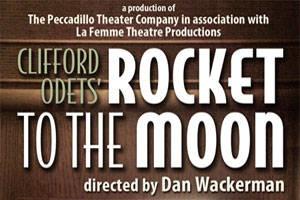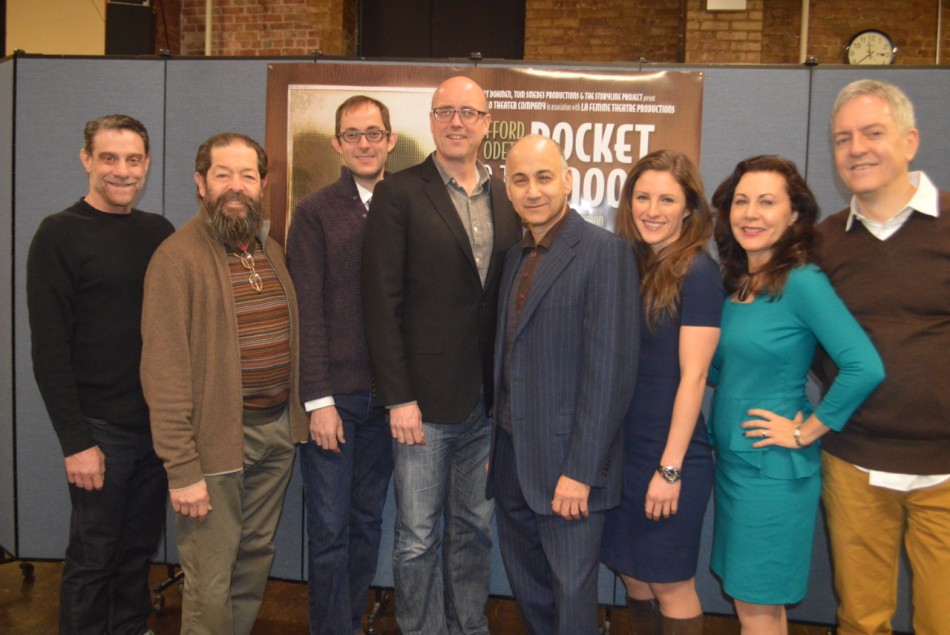
En route to The Theatre at St. Clements on West 46th Street in Manhattan last night, I mentioned to a friend that I wasn't sure I'd ever seen a truly great production of a Clifford Odets play, and that I'd never seen a revival of the relatively obscure one we were about to see -- Rocket To The Moon. I'm happy to report that both facts changed immediately as the lights came up on Harry Feiner's inspired set, and The Peccadillo Theater Company began its soulful, stirring staging of this neglected 1938 piece.
So often, in remounts of Odets, it can seem like the performers are acting in different plays; this actor thinks he’s in a 1930’s gangster movie, that actress thinks she’s Mae West on the vaudeville circuit, etc. More often than not, the proceedings are a total disaster, the performers and the material seemingly at odds with one another and both falling flat on their faces, hard. The result, in my experience, is never pretty, and often much worse than that.
Such is not the case here. The Peccadillo’s production is a delicately masterful ensemble endeavor. While there are stellar individual performances throughtout (as well as a couple of curious casting choices), it would be unfair to single out any one actor. The entire cast gives absolutely everything they have to the whole, and because of this, the whole is so much greater than the sum of its parts. Every actor is fully invested in the material, and the material pays back in dividends. This is Odets the way Odets was meant to be.
A sort of ugly-duckling relative to O’Neill, Williams and Miller, Odets sits uncomfortably in the pantheon of great American playwrights, and praise for him (when it's even given) generally comes saddled with qualifications like “problematic,” “early promise,” “unrealized potential,” and “Hollywood sellout.” His language and his characters can be extreme; it could never be said of a single page of Odets dialogue that the words are dull or lifeless. If anything, they can seem to have too much life. They bubble over -- with enthusiasm, with slang, with aphorisms, with jokes, with philosophy, with nerve, with joie de vivre. Play it too hard, the whole thing explodes in wince-worthy cliches. Play it too soft, and it falls apart -- the actors simply get crushed under the weight of exposed plot and dated speech.
Somehow, The Peccadillo company and director Dan Wackerman have achieved a perfect balance. The pace feels musical, which makes sense and is something of a revelation. It is fortissimo and furious when called for, soft and legate at others (given this rare and welcome sensitivity, it’s a bit surprising that the sound design by David Thomas includes a jarringly anachronistic between-scenes soundtrack; this is a minor quibble).
The cast finds the ridiculous, and they make it natural. They find the outsized emotions, and run straight into them -- the way we all can do when faced with crisis. The people in the plays of Odets are almost always people in crisis. This doesn’t make them lunatics, or buffoons, as they are so often (wrongly) portrayed. Sure, they’re a little neurotic; so are we. Sure, words come out of their mouths that they immediately regret; they come out of our mouths too. Yes, they can be grandiose, obnoxious, sentimental, irrational. So can we. These are not characters peopling a museum devoted to a clumsy, bygone era. They’re us -- imperfect, striving for understanding, desperate for love, dissatisfied, trying to make sense of the world, alive.
Wackerman and his actors do not condescend to Odets. There are no tongues in cheeks here. The company believes in the material, and so we do too. They jump into the fire, and we follow them. The approach here is one of humility, dignity, and respect, and it's moving and effective to watch. The play is given the treatment it asks for, and we are all enriched for it -- audience, company, and playwright.
Bravo to The Peccadillo. This is a production that deserves a much longer and more prominent run than the limited engagement it’s just begun. See it while you can.
